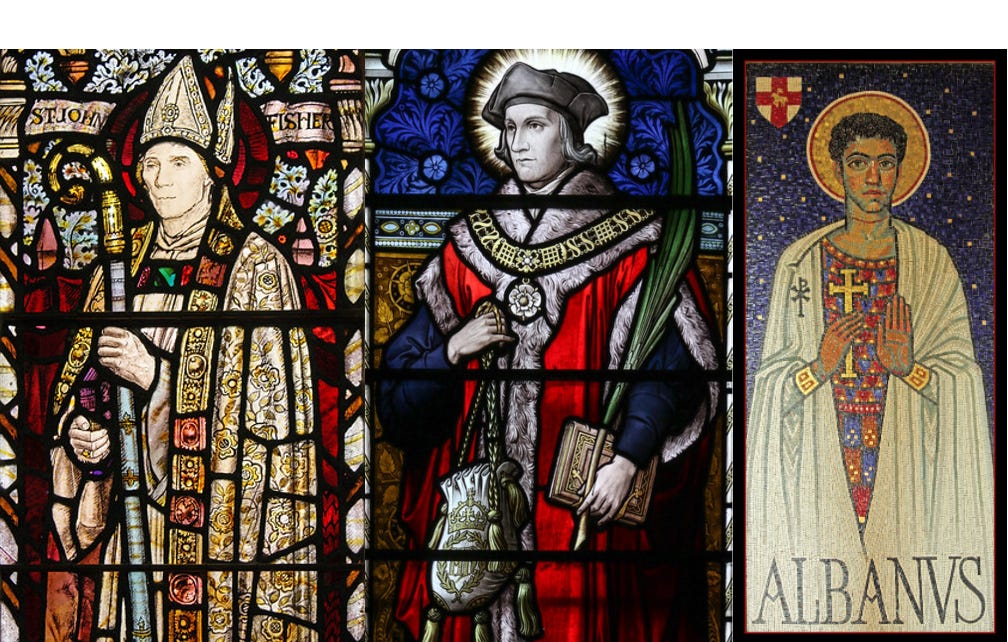“The times are never so bad but that a good man can live in them.” —St. Thomas More
“A good man is not a perfect man;
a good man is an honest man,
faithful and unhesitatingly responsive
to the voice of God in his life.” —St. John Fisher
“What part soever you take upon you, play that as well as you can and make the best of it.” —St. Thomas More
Today is the feast of the great writer, thinker, intellectual, lawyer, politician, father, friend, saint, and martyr Thomas More. It is also the feast of Bishop John Fisher, contemporary of More’s, and of St. Alban, the first British martyr. More and Fisher were two great English martyrs killed for being faithful to true Christian doctrine in the bloody persecutions of King Henry VIII.
More was a leader of a new intellectual movement, a defender of the faith, a devoted father, a revolutionary thinker, and a brilliant lawyer and orator. Indeed, More, though he did struggle and fall along the way as all men do, was one of the few thinkers in history who largely lived up to his own philosophy and theology. He was beloved of almost all until he would not bend the truth to suit the king’s convenience.
Thomas More lost everything—his wealth, his status, his family, even his life—because he knew that denying the truth was a grave sin. In our time, men lie, dissemble, and compromise without a thought. We are told: Compromise is necessary…tolerance is virtue…we cannot hurt anyone’s feelings…you will lose your promotion if you don’t go along. How often do we take the coward’s way out when even a tiny risk is involved! Yet Thomas More was impoverished, humiliated, and executed because he would not sign his name to a paper. That is the stuff of which saints are made.
And it is because he sacrificed everything that we still honor him. Henry VIII, the king who executed More, is still remembered, but nearly everyone—even the members of the heretical church he founded—remember him as a villain. Thomas More’s image and name are honored in churches around the world. I recently visited the Tower of London, where both More and Fisher were imprisoned. One of the Beefeaters, a guard working for the English monarchy, stood below the windows where More and Fisher had sat (see below) and told us, “They were good men who died for what they believed in.”
At the very place where More and Fisher were humiliated, imprisoned, and executed, they are still remembered with respect. Just like St. Alban the 4th century Roman soldier and martyr before them, they died, but their inspiring example lives on. How true it is that “He that findeth his life, shall lose it: and he that shall lose his life for [Christ], shall find it” (Matt.10:39)!
Jesus Christ said, “Every one therefore that shall confess me before men, I will also confess him before my Father who is in heaven. But he that shall deny me before men, I will also deny him before my Father who is in heaven.” (Matt. 10:32-33) And again, Christ said, “Amen I say to you, there is no man who hath left house or brethren, or sisters, or father, or mother, or children, or lands, for my sake and for the gospel, who shall not receive an hundred times as much, now in this time…and in the world to come life everlasting.” (Mark 10:29-30)
Thomas More had so much to live for. He had two marriages that are generally conceded happy and amicable; and he was most especially a devoted father. More homeschooled his children, both boys and girls equally, carefully planning and supervising their education, both secular and religious. He would show others samples of his daughter Margaret’s Latin because he was so proud of her, but it was not mere pride—their deep affection is obvious from her passionately tearful farewell to him while he was on his way to be executed, and from the letter he wrote from prison to his “dearest Meg.”
More reached the heights of political power at home in England and intellectual acclaim both at home and abroad—until King Henry VIII wished to divorce his wife unlawfully for the sake of getting a male heir, which he believed possible through his mistress Anne Boleyn (who, ironically, was later executed by Henry after failing to bear a male child). More had only to pretend to go along with his old friend Henry’s plan of divorce and heresy. But More would not pretend, would not sin.
Cardinal John Fisher, bishop of Rochester, also lost his life because he would not lie—and also, like More, he was pressured by and isolated from his peers. Thomas More said of Fisher, “I reckon in this realm no one man, in wisdom, learning and long approved virtue together, meet to be matched and compared with him.” He, like More, was widely respected—until he would not sin to save himself. Almost every bishop in England assented to Henry VIII’s heresy; but not John Fisher. He stood almost alone. But there was another man who was abandoned by his friends and jeered by the crowd and condemned by the rulers—He hung on a cross, and died, and thus gave life to the world. Fisher and More had an allegiance to their earthly king, but far more did they have an allegiance and obligation to their heavenly King, the King whose throne was a cross and whose crown was made of thorns.
Like their Master Jesus Christ, John Fisher and Thomas More knew that there are more important things than life and prosperity. “For what shall it profit a man, if he gain the whole world, and suffer the loss of his soul?” Jesus asked (Mark 8:36). More and Fisher knew the answer. As More said before his execution, “I die the King’s good servant, but God’s first.”






Thank you!